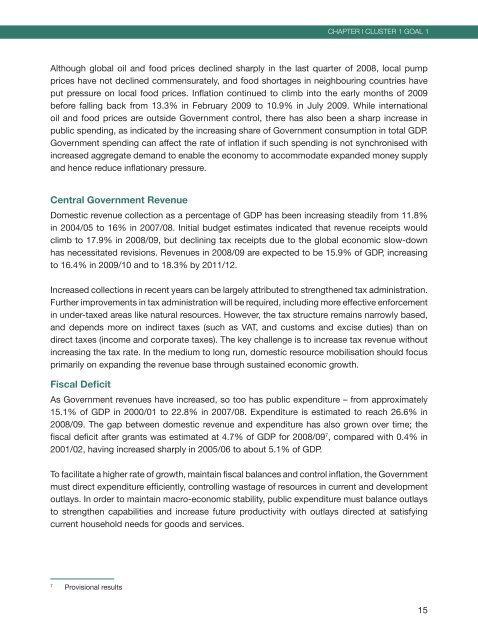Poverty and Human Development Report 2009 - UNDP in Tanzania
Poverty and Human Development Report 2009 - UNDP in Tanzania
Poverty and Human Development Report 2009 - UNDP in Tanzania
Create successful ePaper yourself
Turn your PDF publications into a flip-book with our unique Google optimized e-Paper software.
although global oil <strong>and</strong> food prices decl<strong>in</strong>ed sharply <strong>in</strong> the last quarter of 2008, local pump<br />
prices have not decl<strong>in</strong>ed commensurately, <strong>and</strong> food shortages <strong>in</strong> neighbour<strong>in</strong>g countries have<br />
put pressure on local food prices. <strong>in</strong>flation cont<strong>in</strong>ued to climb <strong>in</strong>to the early months of <strong>2009</strong><br />
before fall<strong>in</strong>g back from 13.3% <strong>in</strong> february <strong>2009</strong> to 10.9% <strong>in</strong> July <strong>2009</strong>. while <strong>in</strong>ternational<br />
oil <strong>and</strong> food prices are outside government control, there has also been a sharp <strong>in</strong>crease <strong>in</strong><br />
public spend<strong>in</strong>g, as <strong>in</strong>dicated by the <strong>in</strong>creas<strong>in</strong>g share of government consumption <strong>in</strong> total gdP.<br />
government spend<strong>in</strong>g can affect the rate of <strong>in</strong>flation if such spend<strong>in</strong>g is not synchronised with<br />
<strong>in</strong>creased aggregate dem<strong>and</strong> to enable the economy to accommodate exp<strong>and</strong>ed money supply<br />
<strong>and</strong> hence reduce <strong>in</strong>flationary pressure.<br />
Central Government Revenue<br />
domestic revenue collection as a percentage of gdP has been <strong>in</strong>creas<strong>in</strong>g steadily from 11.8%<br />
<strong>in</strong> 2004/05 to 16% <strong>in</strong> 2007/08. <strong>in</strong>itial budget estimates <strong>in</strong>dicated that revenue receipts would<br />
climb to 17.9% <strong>in</strong> 2008/09, but decl<strong>in</strong><strong>in</strong>g tax receipts due to the global economic slow-down<br />
has necessitated revisions. revenues <strong>in</strong> 2008/09 are expected to be 15.9% of gdP, <strong>in</strong>creas<strong>in</strong>g<br />
to 16.4% <strong>in</strong> <strong>2009</strong>/10 <strong>and</strong> to 18.3% by 2011/12.<br />
<strong>in</strong>creased collections <strong>in</strong> recent years can be largely attributed to strengthened tax adm<strong>in</strong>istration.<br />
further improvements <strong>in</strong> tax adm<strong>in</strong>istration will be required, <strong>in</strong>clud<strong>in</strong>g more effective enforcement<br />
<strong>in</strong> under-taxed areas like natural resources. however, the tax structure rema<strong>in</strong>s narrowly based,<br />
<strong>and</strong> depends more on <strong>in</strong>direct taxes (such as vat, <strong>and</strong> customs <strong>and</strong> excise duties) than on<br />
direct taxes (<strong>in</strong>come <strong>and</strong> corporate taxes). the key challenge is to <strong>in</strong>crease tax revenue without<br />
<strong>in</strong>creas<strong>in</strong>g the tax rate. <strong>in</strong> the medium to long run, domestic resource mobilisation should focus<br />
primarily on exp<strong>and</strong><strong>in</strong>g the revenue base through susta<strong>in</strong>ed economic growth.<br />
Fiscal Deficit<br />
as government revenues have <strong>in</strong>creased, so too has public expenditure – from approximately<br />
15.1% of gdP <strong>in</strong> 2000/01 to 22.8% <strong>in</strong> 2007/08. expenditure is estimated to reach 26.6% <strong>in</strong><br />
2008/09. the gap between domestic revenue <strong>and</strong> expenditure has also grown over time; the<br />
fiscal deficit after grants was estimated at 4.7% of gdP for 2008/097 , compared with 0.4% <strong>in</strong><br />
2001/02, hav<strong>in</strong>g <strong>in</strong>creased sharply <strong>in</strong> 2005/06 to about 5.1% of gdP.<br />
to facilitate a higher rate of growth, ma<strong>in</strong>ta<strong>in</strong> fiscal balances <strong>and</strong> control <strong>in</strong>flation, the government<br />
must direct expenditure efficiently, controll<strong>in</strong>g wastage of resources <strong>in</strong> current <strong>and</strong> development<br />
outlays. <strong>in</strong> order to ma<strong>in</strong>ta<strong>in</strong> macro-economic stability, public expenditure must balance outlays<br />
to strengthen capabilities <strong>and</strong> <strong>in</strong>crease future productivity with outlays directed at satisfy<strong>in</strong>g<br />
current household needs for goods <strong>and</strong> services.<br />
7 Provisional results<br />
Chapter I CLUSter 1 GOaL 1<br />
15





